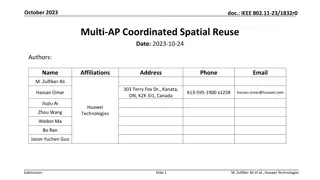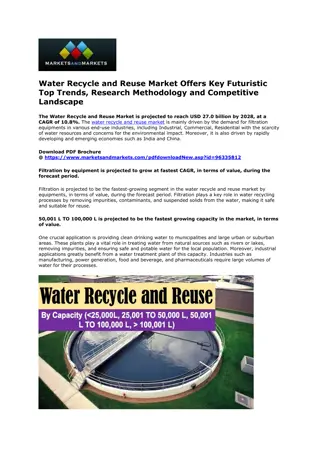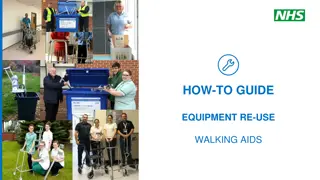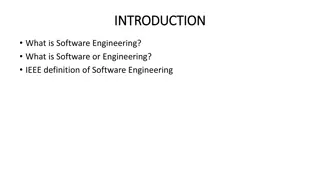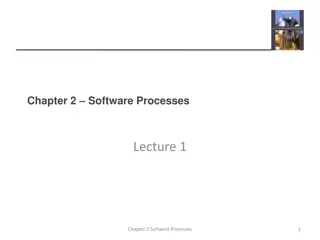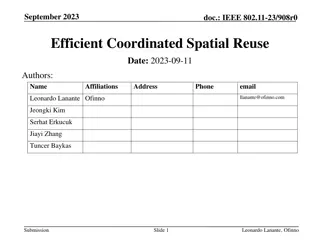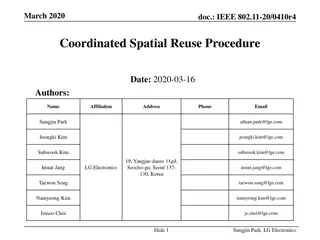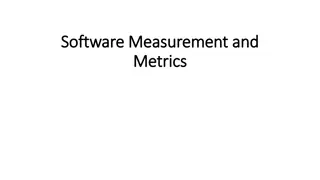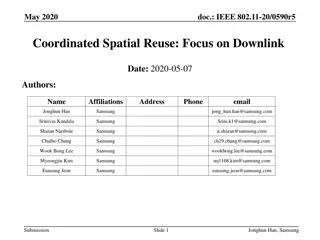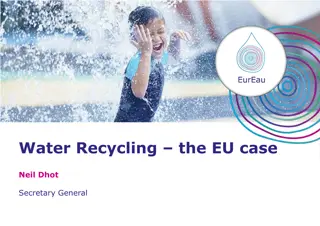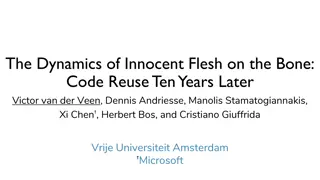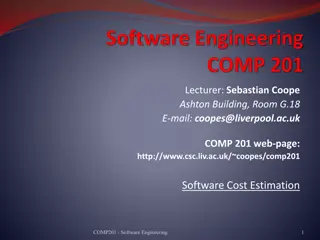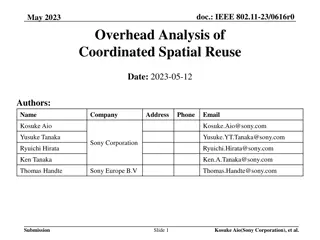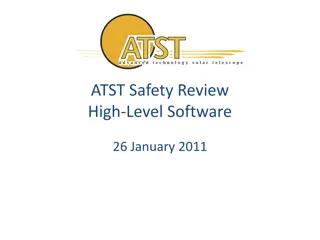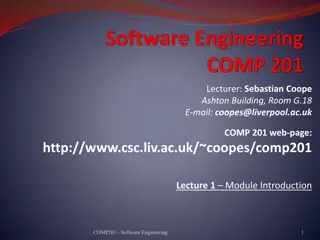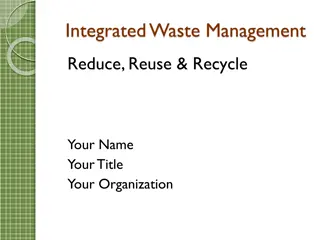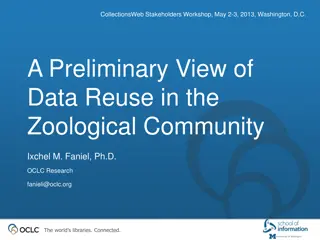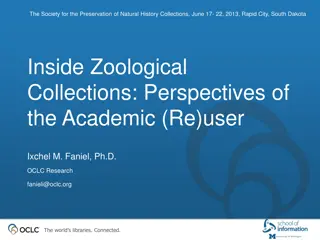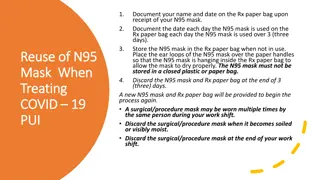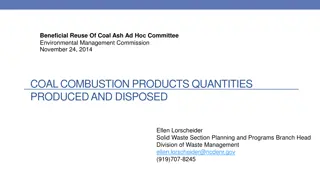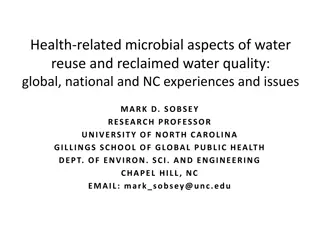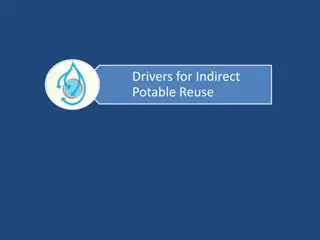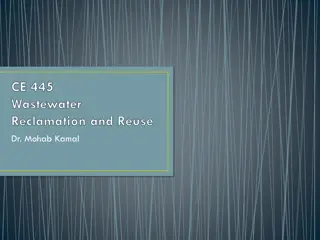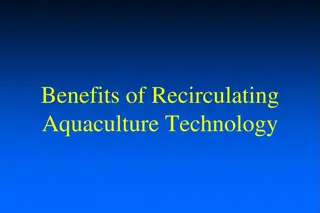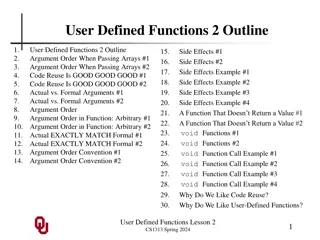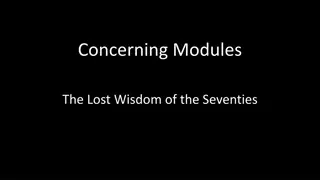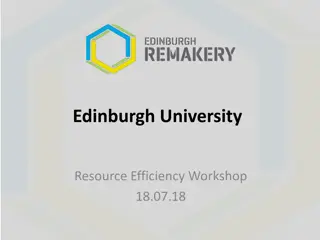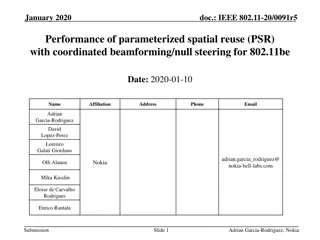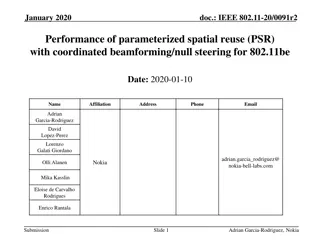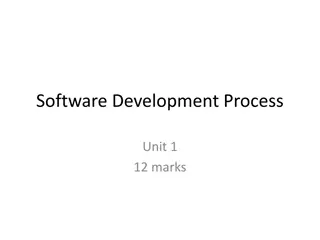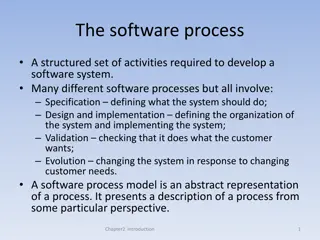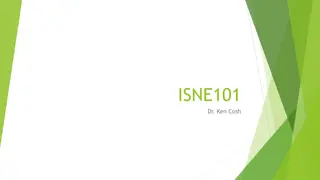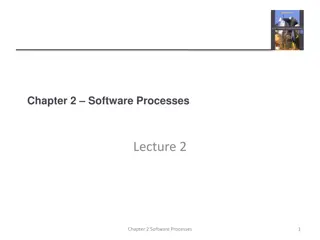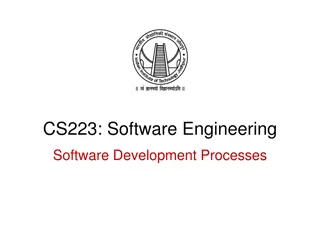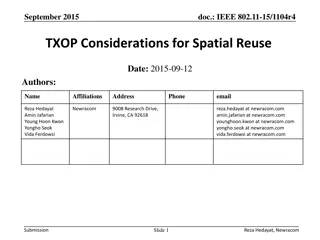Coordinated Spatial Reuse
Explore the concept of Coordinated Spatial Reuse (C-SR) in IEEE 802.11 networks, a scheme where multiple access points (APs) transmit data simultaneously to reduce interference and enhance resource utilization. Learn about the definition, benefits, and necessary components for successful C-SR operat
0 views • 15 slides
Urban Mining and CDW Circular Economy Cost-Benefit Analysis
This case study focuses on comparing the cost and greenhouse gas emissions savings of local processing and reuse of Construction and Demolition Waste (CDW) materials versus sending them to landfills. By developing a prototype cost and GHG savings calculator, the aim is to showcase the potential of e
0 views • 14 slides
Coordinated Spatial Reuse in IEEE 802.11bn Standard
This contribution explores Coordinated Spatial Reuse (Co-SR) as a potential multi-AP feature for the IEEE 802.11bn standard. It discusses the trade-offs, proposes a method for downlink channel access, and evaluates its impact on goodput and packet delivery delay. The background highlights the gains
1 views • 17 slides
Analysis of Power Control for Coordinated Spatial Reuse in IEEE 802.11-24
Evaluation of power control schemes for Coordinated Spatial Reuse (CSR) in IEEE 802.11-24, comparing benefits with and without power control. Results show gains in throughput and SINR with different CSR schemes and considerations for shared access points. Concerns and insights shared on the effectiv
6 views • 24 slides
Sustainable Solutions: Exploring the Water Recycle and Reuse Market
The water recycle and reuse market is projected to reach USD 27.0 billion by 2028, at a CAGR of 10.8% from USD 16.1 billion in 2023. The market growth is driven by factors such as the use of equipments like filtration, Machinery and the increasing demand for the use of water recyle due to the limite
0 views • 5 slides
Reusing Walking Aids for a Greener NHS
Reusing walking aids like crutches, frames, and walking sticks can significantly reduce carbon emissions and waste in the healthcare sector. By implementing walking aid reuse schemes, hospitals can save money, reduce their environmental impact, and contribute to the NHS's sustainability goals. This
0 views • 18 slides
Understanding Software Engineering: Concepts and Characteristics
Software engineering involves the application of scientific principles and methods to develop efficient, reliable software products. The need for software engineering arises due to factors like large software size, scalability, cost concerns, dynamic nature, and quality management. Good software exh
1 views • 25 slides
Understanding Software Processes and Models
Software processes are structured activities essential for software system development, involving specification, design, validation, and evolution. Various process models and approaches like the Rational Unified Process and agile methods are discussed, highlighting the importance of adaptability in
2 views • 105 slides
Understanding Software Processes and Models
This lecture discusses software processes, models, and activities involved in requirements engineering, software development, testing, and evolution. It covers topics such as process models, computer-aided software engineering (CASE) technology, software specification, design, validation, and evolut
2 views • 25 slides
Efficient Coordinated Spatial Reuse in IEEE 802.11-23
Coordinated Spatial Reuse (C-SR) is a Multi-AP transmission technique proposed for UHR networks that enhances efficiency by utilizing RSSI or pathloss feedback instead of complete CSI. This document introduces an efficient protocol for C-SR, focusing on a unified approach for better implementation.
0 views • 10 slides
Understanding IEEE 802.11-20/0410r4 Coordinated Spatial Reuse Procedure
This document presents the Coordinated Spatial Reuse (CSR) procedure in IEEE 802.11-20/0410r4, focusing on the transmission schemes and necessary information for effective spatial reuse. It outlines the topology of CSR environments, acquisition of information for CSR, CSR capability announcement by
8 views • 23 slides
Understanding Software Measurement and Metrics in Software Engineering
Software measurement plays a crucial role in assessing the size, quantity, and quality of software products and processes. It involves direct and indirect measurement methods to monitor and improve software quality, predict future outcomes, and manage project budgets and schedules. Software metrics
0 views • 8 slides
Coordinated Spatial Reuse in IEEE 802.11 Networks
The document discusses Coordinated Spatial Reuse (C-SR) in IEEE 802.11 networks, focusing on downlink transmission. C-SR is a multi-AP coordination scheme aimed at enhancing spectrum efficiency by reusing time/frequency resources among multiple Basic Service Sets (BSSs). The procedure is divided int
1 views • 24 slides
Water Recycling in the EU - Addressing Challenges and Benefits
Water recycling in the EU is gaining traction due to the increasing pressure on water resources. Recovered water treated to safe standards has economic and environmental benefits. Despite challenges like costs, it has potential for applications in agriculture and industry. EurEau, representing water
0 views • 13 slides
Code Reuse Ten Years Later: A Study on Gadget Finding
This study by Victor van der Veen and team from Vrije Universiteit Amsterdam, along with Xi Chen from Microsoft, delves into the dynamics of innocent flesh on the bone in the context of code reuse. The researchers focus on gadget finding and provide valuable insights through their analysis.
0 views • 94 slides
Software Cost Estimation in Software Engineering
Software cost estimation in software engineering involves predicting the resources required for a software development process. It includes fundamental estimation questions, software cost components, costing and pricing considerations, software pricing factors, and programmer productivity assessment
0 views • 30 slides
Overhead Analysis of Coordinated Spatial Reuse in IEEE 802.11-23
Analysis of overhead components impacting the performance of Coordinated Spatial Reuse (Co-SR) in IEEE 802.11-23 standard for wireless communication. Evaluation of MAC overhead, negotiation and measurement phases, and frames in the negotiation phase. Discussion on the impact of overhead on Co-SR per
0 views • 14 slides
ATST Safety Review High-Level Software Overview
This document provides an overview of the high-level software components involved in the ATST Safety Review conducted on 26th January 2011. It includes details on the Telescope Software Control Systems, Observatory Software Control Systems, and Instrument Software Control Systems, along with respons
13 views • 15 slides
Understanding Software Engineering: An Overview by Lecturer Sebastian Coope
Explore the world of software engineering with Lecturer Sebastian Coope in this informative module introduction. Discover the importance of structured and disciplined approaches in making software, the challenges in software development, and the necessity of software engineering in handling complex
5 views • 37 slides
Effective Strategies for Integrated Waste Management
Learn about the importance of integrated waste management, including waste reduction, reuse, and recycling practices. Discover how managing waste can conserve resources, reduce pollution, and save landfill space. Explore strategies such as source reduction, reuse of products, and making environmenta
0 views • 17 slides
Exploring Data Reuse in the Zoological Community
Preliminary findings from a project funded by the Institute for Museum and Library Services led by Drs. Ixchel Faniel and Elizabeth Yakel delve into the intersection of data reuse and digital preservation in quantitative social science, archaeology, and zoology. The research focuses on identifying t
0 views • 12 slides
Digital Preservation in Academic Research Data Reuse
The Society for the Preservation of Natural History Collections conducted a project funded by IMLS to study data reuse and digital preservation in academic disciplines. The research team explored significant properties of social science, archaeological, and zoological data for effective preservation
0 views • 14 slides
Proper Storage and Reuse Guidelines for N95 Masks and Gowns
Learn about the correct way to store, document, and reuse N95 masks and gowns to ensure their effectiveness and safety. Follow the recommended practices to help reduce contact transmission and maximize the lifespan of these essential protective equipment items. Regular documentation, proper storage
0 views • 8 slides
Beneficial Reuse of Coal Ash Ad Hoc Committee Report
The report discusses the beneficial reuse of coal combustion products, outlining various applications like soil nutrient additives, manufacturing materials, structural fills, and recovery of contained materials. It highlights different types of structural fills and their distribution by county in No
0 views • 12 slides
Understanding Health Risks in Reclaimed Water and Water Reuse
Exploring the microbial aspects of reclaimed water and wastewater reuse is crucial for public health. Pathogenic microorganisms present in wastewater, such as bacteria, viruses, and parasites, can lead to gastrointestinal and systemic illnesses in humans. Proper removal and inactivation of these pat
0 views • 25 slides
Strategies for Sustainable Water Management
Drivers for indirect potable reuse include water stress, population growth, industrial development, droughts, and climate change. Other drivers for water reuse encompass conservation, environmental enhancement, pollution abatement, and regulatory policies. Rising water rates and costs of imported wa
0 views • 21 slides
Design Principles for Water Reclamation and Reuse
Achieving consistent reclaimed water quality requires proper treatment strategies, technical controls, online monitoring, and operational controls. The design principles focus on elements like monitoring, attenuation, retention, and blending to ensure water quality for various reuse applications. Wa
0 views • 22 slides
Advantages of Recirculating Aquaculture Systems for Sustainable Fish Production
Recirculating aquaculture technology offers numerous benefits such as water reuse, minimized water consumption, enhanced biosecurity, and cost-effectiveness. By adopting recirculating systems, aquaculture farms can comply with stricter regulations, address water scarcity issues, and optimize product
0 views • 13 slides
Understanding User-Defined Functions and Code Reuse
In this lesson, we delve into user-defined functions, exploring topics such as argument order when passing arrays, the importance of code reuse for efficiency, and the significance of actual versus formal arguments. Through examples and explanations, we unravel the principles behind creating reusabl
0 views • 30 slides
Insights from NATO Software Engineering Conferences and The Software Crisis of the Seventies
Exploring the challenges faced in software engineering during the 1970s, including issues such as project delays, inefficiencies, and the critical need for reliable, high-quality software. Insights from the NATO Software Engineering Conferences shed light on the struggle to meet increasing modern so
0 views • 46 slides
Promoting Resource Efficiency and Waste Reduction in Edinburgh
Discover how Edinburgh Remakery is leading the way in reducing waste through repair, reuse services, and community support. Engage in their charitable activities, from repair surgeries to workshops, all aimed at fostering a culture of repair and reuse across Edinburgh. Through partnerships with key
0 views • 13 slides
Performance Evaluation of Parameterized Spatial Reuse with Coordinated Beamforming for IEEE 802.11be
The study focuses on assessing the performance of parameterized spatial reuse (PSR) with coordinated beamforming/null steering for IEEE 802.11be. The framework allows coordinated sharing of uplink transmission opportunities among APs, demonstrating gains in synchronous coordinated beamforming system
0 views • 19 slides
Performance Evaluation of Coordinated Beamforming with Parameterized Spatial Reuse in IEEE 802.11be
The document discusses the performance evaluation of coordinated beamforming with parameterized spatial reuse (PSR) in IEEE 802.11be. It explores the practical operation of the 802.11ax PSR framework with null steering and the key implementation benefits, emphasizing unsynchronized operation and ada
0 views • 20 slides
Software Bingo_ A Game-Changing Addition to Your Online Casino
Discover how software bingo, bingo game software, professional bingo software, software for bingo, pc bingo games software can enhance your online casino and boost player engagement.\n\nSource>>\/\/ \/bingo-software\n\n
0 views • 4 slides
Understanding the Essence of Software Development Process
Software is a vital component in today's technology-driven world. It consists of instructions, data structures, and descriptive information that enable the functioning of computer programs. Unlike hardware manufacturing, software development is an engineering process that undergoes changes and deter
0 views • 74 slides
Understanding Software Process Models
Software process models encompass various activities like specification, design, validation, and evolution involved in developing a software system. This includes plan-driven and agile processes, as well as models like the waterfall model and reuse-oriented software engineering. Embracing elements f
0 views • 7 slides
Understanding Software Engineering Fundamentals
Explore the significance of software in modern economies, the attributes of good software, software engineering principles, software processes, and process models. Learn how software engineers ensure functionality, maintainability, dependability, efficiency, and usability in software development.
0 views • 25 slides
Software Development Processes and Challenges
Incremental development offers benefits such as reduced costs, faster feedback, and more rapid delivery. However, challenges like visibility issues and system structure degradation can arise. Reuse-oriented software engineering focuses on systematic reuse for building business systems. Different typ
0 views • 10 slides
Understanding Software Engineering and Development Processes
Explore the key concepts of software engineering, including misconceptions, legacy software, and development phases. Learn about professional responsibilities, the need for software processes, the ETVX model, and different properties of software processes. Discover the components of software process
0 views • 57 slides
IEEE 802.11-15/1104r4: Optimizing CCA Threshold for Spatial Reuse in WLANs
The document discusses considerations for optimizing the Clear Channel Assessment (CCA) threshold in wireless local area networks (WLANs) to enhance spatial reuse efficiency. It emphasizes minimizing over-protection caused by the current CCA rule while addressing factors like frequency reuse, BSS/OB
0 views • 18 slides


